‘Stop Killing Us:’ A Cry for Justice and End to Police Murder
By Richard B. Muhammad and J.A. Salaam -Final Call Staffers- | Last updated: Nov 18, 2014 - 10:42:49 AMWhat's your opinion on this article?
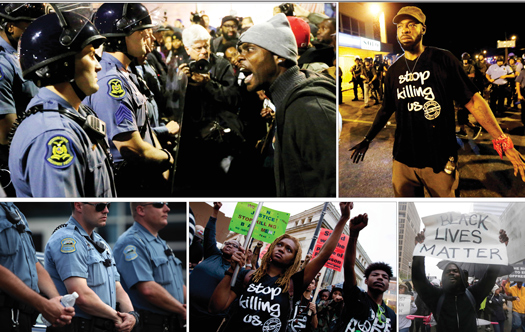
|
Ferguson, Missouri is ground zero in a national assault on Black community
FERGUSON, Mo. (FinalCall.com) - Just over 100 days ago it would have been hard for anyone to locate this small predominantly Black suburb outside of St. Louis.
But the killing of Black teenager Mike Brown put Ferguson on the lips, minds and hearts of everyone from Blacks fed up with what they call police murders to President Obama, who met with protest leaders in the White House.
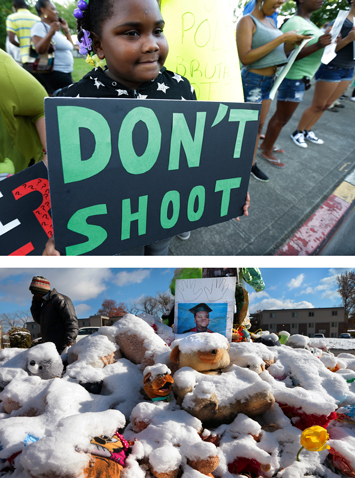
Jaerina Willis, 7, holds a sign that reads "Don't Shoot" as she attends an evening rally, Aug. 19 in Tacoma, Wash. Several hundred people attended the peaceful gathering to show support for protesters in Ferguson, Mo., where the fatal shooting of 18-year-old Michael Brown has sparked nightly encounters between protesters and police.
|
Angry demonstrations over the killing of the 18-year-old by Ferguson police officer Darren Wilson, exasperation over the failure of the county prosecutor to indict Mr. Wilson and a long, tense wait for a grand jury to decide whether the White officer should face charges brought the city to the brink of an explosion that threatened to spread across the country.
“I saw kids get tear gassed,” said Joshua Williams, 18, of Lost Voices, a group that emerged out of demonstrations and protests after the death of his cousin, Mike Brown.
Lost Voices was born out of Black youths’ shared stand against police and shared suffering. They have literally slept on the street, occupied the streets, worked through occasional internal differences and have grown more disciplined in confrontations with police, said young Joshua.
Lost Voices has been asked to speak in other cities, and protests and gatherings have been held in solidarity with Ferguson, causing law enforcement across the country to grow concerned about a widespread uprising.
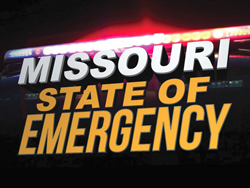
|
There has also been a response from the state’s chief executive and police departments who ordered extra ammunition, handcuffs, tear gas and weaponry as businesses were boarded up in Ferguson and some nearby towns. Gun sales have increased. The KKK vowed to step in and protect White lives, though no White lives have been lost.
The FBI issued a national bulletin warning police departments of possible violence.
State of Emergency declared
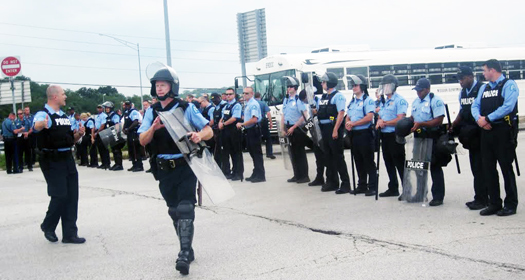
Images of heavily armed officers have shocked the public. Photos: J.A. Salaam
|
Democratic governor Jay Nixon declared a state of emergency Nov. 17 and activated the National Guard. The order placed the Missouri State Highway Patrol, St. Louis County Police Department and the St. Louis Metropolitan Police Department under a unified command “to protect civil rights and ensure public safety in the City of Ferguson and the St. Louis region.”
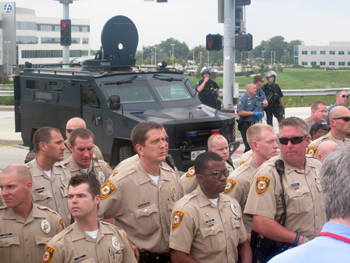
Military style vehicles have been rolled out for peaceful protests.
|
The governor plans to appoint a 15-person “Ferguson Commission” to look at “social and economic conditions” that surfaced with protests. The commission will look the causes of the problems, how to address concerns and make recommendations to the governor. It is expected to take six months to a year to complete its work.
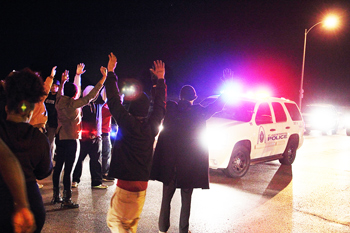
Protestors approach police officers in St Louis.
|
“We’re fighting so that Black kids out here aren’t continually killed by police,” said Reggie Noble, a 30-year-old St. Louis resident. He helped organize and manage late night protests in the city. One protest followed the killing of Vonderrit Meyers, Jr., in October. The Black 18-year-old was shot to death by a White police officer acting as a private security guard in the Shaw neighborhood.
Every 28 hours in 2012 someone employed or protected by the U.S. government killed a Black man, woman, or child, according to “Operation Ghetto Storm: 2012 Annual Report on the Extrajudicial Killings of 313 Black People by Police, Security Guards, and Vigilante,” which was published by Malcolm X Grassroots Movement.
“The United States government has no interest in revealing these facts and police unions actively suppress them. The corporate media is so permeated with White supremacist and capitalist assumptions and rationalizations that reporters and editors deem these killings unworthy of note. With one important exception: They use the stories of ‘officer-involved killings’ to reinforce a stereotypical, but strategic depiction of the most dispossessed sectors of the Black working class as criminal commodities, fit for disposal,” the report noted.
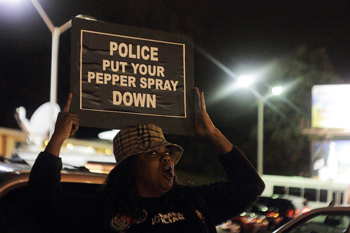
Protestor outside police station in Ferguson, Mo.
|
No justice? No end in sight for protests
Historically protests haven’t lasted as long as the Ferguson rebellion and cries for justice. The Watts Riot raged for six days, August 11-17, 1965. In 1917, riots East St. Louis, Ill. started July 2 and lasted nearly a week. Activists note after more than 100 days of protest, nothing has been done and not even a police report issued in the killing of Mike Brown. At Final Call presstime, the grand jury decision was still pending. Activists complained online that the governor was invisible or inept when he did act. Controversial county prosecutor Bob McCulloch is still on the case despite a leaky grand jury proceeding that was supposed to be secret and thousands of signatures calling for him to recuse himself from the Brown case, they added.
Since the Aug. 9 shooting of Mr. Brown have come the fatal police shootings of Kajieme Powell and Vonderrit Myers, Jr., by St. Louis police officers, whose identities are still unknown. Mr. Powell had mental issues and a small knife and the Myers’ family rejects police claims that their son had a weapon.
Major marches drawing people from around the country have been held. Civil rights leader Al Sharpton has come to Ferguson urging justice for the family of Mike Brown. The Justice Dept. has been involved. Attorney General Eric Holder has visited, but little has changed.
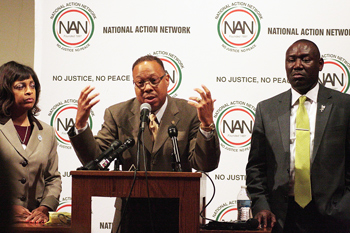
Atty. Anthony Gray speaks as Atty. Benjamin Crump listens in the background. The lawyers represent the parents of slain teen Mike Brown.
|
“It’s like they saying it’s okay to gun a young Black man down in the streets. If they don’t indict him (Darren Wilson). It will be like we don’t got no say so like we not a part of the human race. It says it’s okay to leave a man in the streets dead like that,” said 18-year-old Scoolo of the Lost Voices.
“If Darren Wilson walks, I can’t give you my emotions right now, I don’t know what I’m going to do,” said Tiny, 49, of Lost Voices. “Like when they spit in my child’s face I was in my emotions. At the Ram’s game that guy spit in my daughter’s face and I punched him. They arrested me and my baby but they didn’t arrest the guy who spit in her face. I’m real peaceful but if you step on my family it’s a whole different thing.”
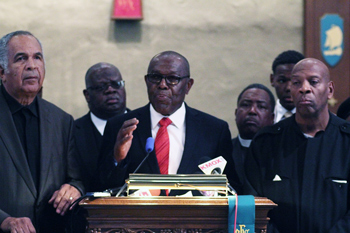
A. Akbar Muhammad, fl anked by Zaki Baruti, left, and Anthony Shahid, right, talks about planned holiday spending boycott. Photos: D.L. Phillips
|
“If they wanted peace they would send in peacekeepers and not soldiers, peacekeepers don’t wear riot gear and carry weapons,” added attorney Gray.
“Regardless of the decision of the grand jury this will be a deciding moment in the history of Missouri,” said Atty. Crump. The two lawyers represent Mike Brown’s parents who went to Geneva, Switzerland to testify about their son’s death and police brutality inside America.
An unarmed youth murdered with witnesses saying his hands were in the air and no one charged 100 days later shows the lack of respect for Black life, said Jasiri X, an activist and hip hop artist based in Pittsburgh. He has been to Ferguson three times to support resistance efforts.
Protests, arrests, demonstrations and organizing people all over the county and still no charges, he said. It’s just like the killing of Trayvon Martin, another unarmed Black teen, by George Zimmerman, added Jasiri X. It took massive efforts and protests just to get a trial, he noted.
Jasiri X had Tef Poe, one of the young leaders in Ferguson, come to his city for a program called “Could Pittsburgh Be The Next Ferguson?”
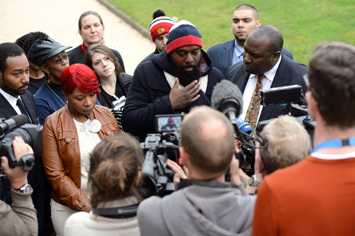
Lesley McSpadden, right, Michael Brown, Sr., left, parents of teenager Michael Brown who was shot by a policeman in Ferguson, Missouri, and attorney Daryl Parks, center, speak during a press conference about the UN Committee Against Torture that convened to evaluate the U.S. government's compliance with the Convention Against Torture, in Geneva, Switzerland, Nov. 12. Photo: AP/Wide World photos
|
“We were just having a conversation. People were nervous and wanted more police officers just because of a discussion,” Jasiri X continued.
The country is one incident away from an explosion and it could come in Ferguson or in Chicago as Min. Louis Farrakhan has warned, Jasiri X added.
“The people in Ferguson resisted, they fought back. Mike Brown means, we got to fight back. The people in power don’t care if another Black youth gets shot or killed by police. It is the resistance that they are afraid of, the Crips and Bloods and street organizations came together and young people stood on the front lines and faced down tanks,” he said.
Sadiki Kambon of the Boston-based Black Community Information Center, understands fully the focus and importance of what is happening in the Midwest, citing his city’s “Ferguson implications.” Some young people went to protest in the Missouri town but Boston has its own problem targeting young Black males through stop and frisk by police officers, he said. The ACLU disclosed that 70 percent of those stopped by officers were Black, he said. “We know if 70 percent of stops are us it’s racism and at any point one of our young Black men could be the next Michael Brown,” said Mr. Kambon. Blacks are 24 percent of Boston residents.
Police are harassing young Black men on a regular basis, said the grandfather, who shared how police officers have stopped him.
“Nothing has really changed,” said the longtime activist.
Integration was never the answer and there is a certain hatred of Black men and there are things Black men have failed to do, argued Mr. Kambon. “There was a time White folks knew if you messed with us, it would be a problem. You had different organizations, if you crossed this line there was a problem,” he said.
Some see electoral politics as the answer, he sees Blacks taking care of their own as the solution. “We are not in control of anything, if you don’t control your own situation it’s game on with us being ridiculed and ripped apart,” said Mr. Kambon. “Until we can get grounded and start establishing what we need for ourselves we are in trouble. We don’t have anything to offer our young people.”
“We understand that racism is out here, but it doesn’t have to be like this,” he said.
A. Akbar Muhammad of the Nation of Islam said New Africa magazine’s headline “Black America Vs. White Police,” captures the reality in the United States. Even looking from abroad, the magazine clearly sees a case where Black people in America facing abusive White police who have shot down young Black men and Black women over the years, said Mr. Muhammad, a longtime St. Louis resident and leader.
Ferguson ended up being Ground Zero by circumstance because police lost control of the crime scene, which traditionally has not happened, he said. This time with young people on the streets with cameras and using social media, the incident was not able to be twisted, controlled, swept away and forgotten, said Mr. Muhammad, who helped organize the Justice for Michael Brown Leadership Coalition.
This is similar to the beginning of the civil rights movement, this is our second movement in America against a history of police brutality, which was mentioned by the Hon Elijah Muhammad in the Muslim Program, he added.
No indictment would be a signal that this deep-rooted racism runs through the core of many communities where police interact with Black people but police departments protect and back their own at all costs, said Mr. Muhammad. In the face of the brutal murder of this young man, people will not accept it and will not allow business as usual, he continued. As a St. Louis area business leader noted, “the genie is out of the bottle, we have to figure out what to do,” said Mr. Muhammad. The genie that was kept and controlled was Black people but this is a protracted struggle and there is no going back, he said. Police across the country are already acting differently, and there needs to be consideration about whether military vets damaged from service in Iraq and Afghanistan should be on police forces, Mr. Muhammad said. They cannot go hunting and killing Black young men in cold blood, he said.
The young Black leaders, female and male, who have arisen are impressive, said older activists and their allies. But, said Mr. Muhammad, the police are looking at photos and videos, identifying young people and accusing them of crimes, like looting. These young people must be supported and defended, he said. When American colonists tossed British tea into Boston Harbor, it wasn’t called looting, Mr. Muhammad noted. It was a method of protest and hurting the oppressor economically and young people need the same consideration, he argued. “They paint us as thugs in the street but this is a reaction to the oppression we have suffered over the years,” said Mr. Muhammad.
Officials in Ferguson and nearby small towns have admitted using traffic stops and fines to target young people and when people run out of money, they face warrants and go to jail because of a simple traffic stop, he observed. These officials and police have used us to make money to fund these municipalities and people, young and old, feel angry and are expressing that anger, said Mr. Muhammad.
The city was gripped by fear because of leaks, rumors and news media reports of spiking gun sales and shops running out of ammunition and guns, he said. Police officials are on a public relations campaign but the prosecutor has not properly handled the case, Mr. Muhammad charged. “Why would they do that to the people? Why would the prosecutor McCullough play us like a ping pong ball back and forth, it is wrong and criminal.”
INSIDE STORIES AND REVIEWS
-
-
About Harriett ... and the Negro Hollywood Road Show
By Rabiah Muhammad, Guest Columnist » Full Story -
Skepticism greets Jay-Z, NFL talk of inspiring change
By Bryan 18X Crawford and Richard B. Muhammad The Final Call Newspaper @TheFinalCall » Full Story -
The painful problem of Black girls and suicide
By Charlene Muhammad -National Correspondent- » Full Story -
Exploitation of Innocence - Report: Perceptions, policies hurting Black girls
By Charlene Muhammad -National Correspondent- » Full Story -
Big Ballin: Big ideas fuel a father’s Big Baller Brand and brash business sense
By Bryan Crawford -Contributing Writer- » Full Story






 Click Here Stay Connected!
Click Here Stay Connected!








